7A Unit4语言点归纳
七年级上册英语unit4知识点

七年级上册英语unit4知识点七年级上册英语Unit4 知识点Unit4主要涉及描述人物外貌、性格和兴趣爱好等常用英语表达。
本文将介绍Unit4的知识点,以帮助读者巩固英语语法和词汇。
一、基本句型1.主语+be动词+形容词例如:Tom is tall and thin.Lily is beautiful and kind.2.主语+be动词+不定式例如:My dream is to be a doctor.His goal is to travel around the world.3.主语+be动词+名词例如:She is a teacher.He is a musician.4.主语+动词+副词例如:The dog runs quickly.She speaks English fluently.5.主语+动词+宾语例如:He likes playing basketball. They enjoy watching movies.6.主语+动词+间接宾语+直接宾语例如:She gave him a book.They showed us how to cook.7.主语+情态动词+动词原形例如:I can swim.He should study harder.二、形容词形容词用于描述人的外貌和性格,下面列出一些常用的形容词:外貌高:tall矮:short胖:fat瘦:thin漂亮:beautiful帅气:handsome性格友好:friendly腼腆:shy聪明:smart勇敢:brave慷慨:generous害羞:timid三、不定式不定式用于表示目的或意图,下面列举一些常用的不定式:to be:成为to do:做to have:拥有to go:去to learn:学习to play:玩to read:读to see:看to sing:唱歌四、人物的兴趣爱好人物的兴趣爱好也是本单元的重点,下面是一些有用但简单的短语:play sports:运动listen to music:听音乐play musical instruments:演奏乐器read books:阅读watch TV:看电视draw pictures:画画write stories:写作五、总结总之,Unit4主要强调描述人物的外貌、性格和兴趣爱好等方面。
人教选修七 Unit4 Sharing词汇语言点
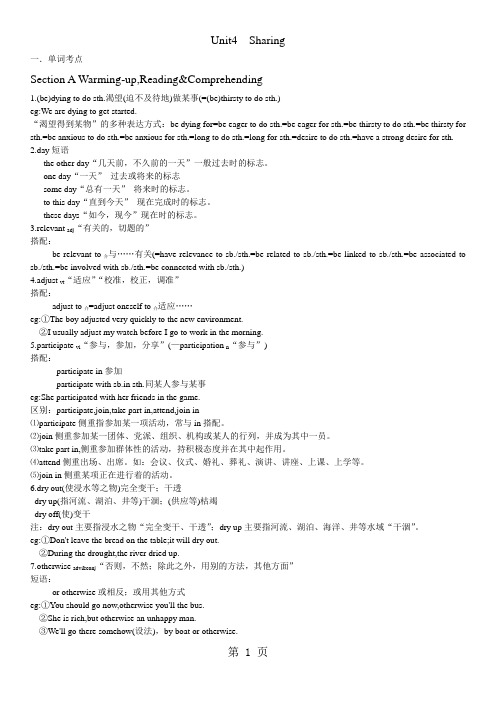
Unit4 Sharing一.单词考点Section A Warming-up,Reading&Comprehending1.(be)dying to do sth.渴望(迫不及待地)做某事(=(be)thirsty to do sth.)eg:We are dying to get started.“渴望得到某物”的多种表达方式:be dying for=be eager to do sth.=be eager for sth.=be thirsty to do sth.=be thirsty for sth.=be anxious to do sth.=be anxious for sth.=long to do sth.=long for sth.=desire to do sth.=have a strong desire for sth. 2.day短语the other day“几天前,不久前的一天”一般过去时的标志。
one day“一天”过去或将来的标志some day“总有一天”将来时的标志。
to this day“直到今天”现在完成时的标志。
these days“如今,现今”现在时的标志。
3.relevant adj“有关的,切题的”搭配:be relevant to介与……有关(=have relevance to sb./sth.=be related to sb./sth.=be linked to sb./sth.=be associated to sb./sth.=be involved with sb./sth.=be connected with sb./sth.)4.adjust vt“适应”“校准,校正,调准”搭配:adjust to介=adjust oneself to介适应……eg:①The boy adjusted very quickly to the new environment.②I usually adjust my watch before I go to work in the morning.5.participate vi“参与,参加,分享”(—participation n“参与”)搭配:participate in参加participate with sb.in sth.同某人参与某事eg:She participated with her friends in the game.区别:participate,join,take part in,attend,join in⑴participate侧重指参加某一项活动,常与in搭配。
牛津译林版七年级英语上册7A Unit4单元知识点总结
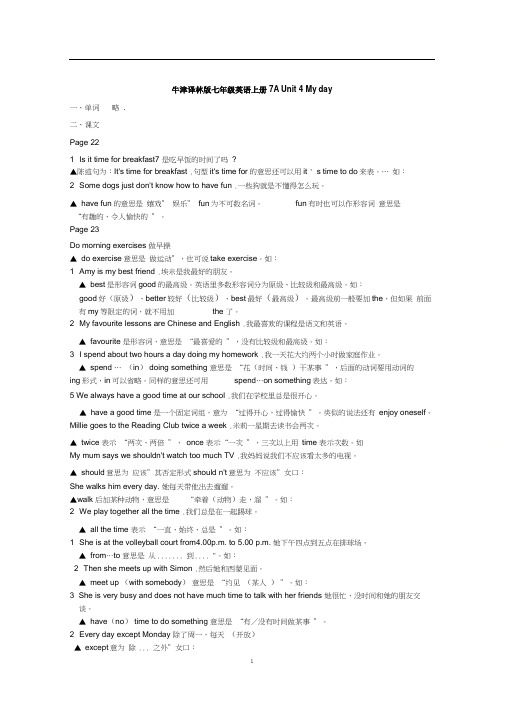
牛津译林版七年级英语上册7A Unit 4 My day一、单词略.二、课文Page 221 Is it time for breakfast7 是吃早饭的时间了吗?▲陈述句为:It's time for breakfast .句型it's time for的意思还可以用it ' s time to do来表。
… 如:2 Some dogs just don't know how to have fun .一些狗就是不懂得怎么玩。
▲have fun的意思是嬉戏” 娱乐” fun为不可数名词。
fun有时也可以作形容词意思是“有趣的,令人愉快的”。
Page 23Do morning exercises 做早操▲do exercise意思是做运动”,也可说take exercise。
如:1 Amy is my best friend .埃米是我最好的朋友。
▲best是形容词good的最高级。
英语里多数形容词分为原级、比较级和最高级。
如:good好(原级)、better较好(比较级)、best最好(最高级)。
最高级前一般要加the,但如果前面有my等限定的词,就不用加the 了。
2 My favourite lessons are Chinese and English .我最喜欢的课程是语文和英语。
▲favourite 是形容词,意思是“最喜爱的”,没有比较级和最高级。
如:3 I spend about two hours a day doing my homework .我一天花大约两个小时做家庭作业。
▲spend … (in) doing something 意思是“花(时间、钱)干某事”,后面的动词要用动词的ing形式,in可以省略。
同样的意思还可用spend…on something表达。
如:5 We always have a good time at our school .我们在学校里总是很开心。
人教版七年级英语上册unit 4 句子讲解及知识点梳理
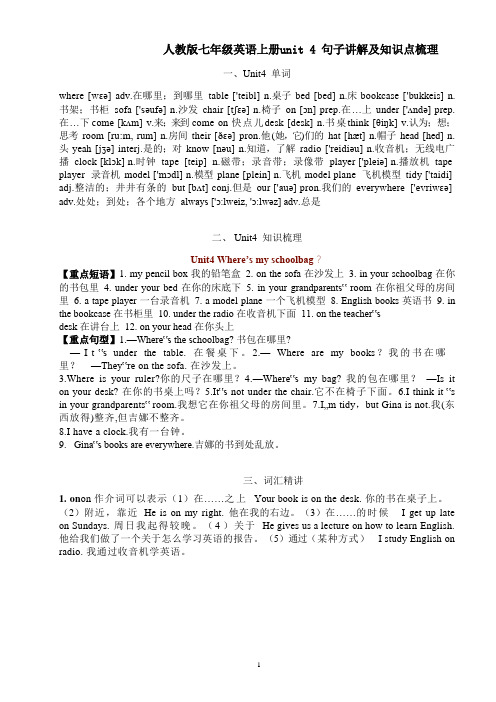
人教版七年级英语上册unit 4 句子讲解及知识点梳理一、Unit4 单词where [wɛə] adv.在哪里;到哪里table ['teibl] n.桌子bed [bed] n.床bookcase ['bukkeis] n. 书架;书柜sofa ['səufə] n.沙发chair [tʃɛə] n.椅子on [ɔn] prep.在…上under ['ʌndə] prep. 在…下come [kʌm] v.来;来到come on 快点儿desk [desk] n.书桌think [θiŋk] v.认为;想;思考room [ru:m, rum] n.房间their [ðɛə] pron.他(她,它)们的hat [hæt] n.帽子head [hed] n. 头yeah [jʒə] interj.是的;对know [nəu] n.知道,了解radio ['reidiəu] n.收音机;无线电广播clock [klɔk] n.时钟tape [teip] n.磁带;录音带;录像带player ['pleiə] n.播放机tape player 录音机model ['mɔdl] n.模型plane [plein] n.飞机model plane 飞机模型tidy ['taidi] adj.整洁的;井井有条的but [bʌt] conj.但是our ['auə] pron.我们的everywhere ['evriwɛə] adv.处处;到处;各个地方always ['ɔ:lweiz, 'ɔ:lwəz] adv.总是二、 Unit4 知识梳理Unit4 Where’s my schoolbag?【重点短语】1. my pencil box 我的铅笔盒 2. on the sofa 在沙发上 3. in your schoolbag 在你的书包里4. under your bed 在你的床底下 5. in your grandparents‟ room 在你祖父母的房间里 6. a tape player 一台录音机7. a model plane 一个飞机模型8. English books 英语书9. in the bookcase 在书柜里10. under the radio 在收音机下面11. on the teacher‟sdesk 在讲台上12. on your head 在你头上【重点句型】1.—Where‟s the schoolbag? 书包在哪里?—I t ‟s under the table. 在餐桌下。
仁爱版英语七年级上册7A_unit4_topic2_课文重难点讲解(含答案)
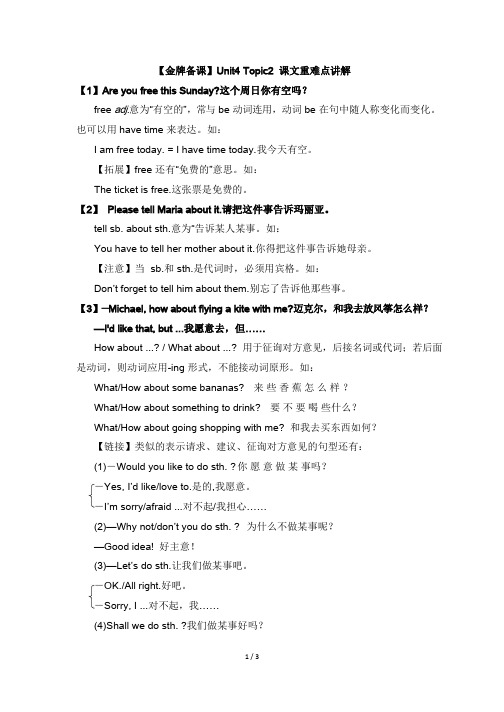
【金牌备课】Unit4 Topic2 课文重难点讲解【1】Are you free this Sunday?这个周日你有空吗?free adj.意为“有空的”,常与be 动词连用,动词be 在句中随人称变化而变化。
也可以用have time 来表达。
如:I am free today. = I have time today.我今天有空。
【拓展】free 还有“免费的”意思。
如:The ticket is free.这张票是免费的。
【2】Please tell Maria about it.请把这件事告诉玛丽亚。
tell sb. about sth.意为“告诉某人某事。
如:You have to tell her mother about it.你得把这件事告诉她母亲。
【注意】当sb.和sth.是代词时,必须用宾格。
如:Don’t forget to tell him about them.别忘了告诉他那些事。
【3】-Michael, how about flying a kite with me?迈克尔,和我去放风筝怎么样?—I'd like that, but ...我愿意去,但……How about ...? / What about ...? 用于征询对方意见,后接名词或代词;若后面是动词,则动词应用-ing 形式,不能接动词原形。
如:What/How about some bananas? 来些香蕉怎么样?What/How about something to drink? 要不要喝些什么?What/How about going shopping with me? 和我去买东西如何?【链接】类似的表示请求、建议、征询对方意见的句型还有:(1)-Would you like to do sth. ?你愿意做某事吗?-Yes, I’d like/love to.是的,我愿意。
-I’m sorry/afraid ...对不起/我担心……(2)—Why not/don’t you do sth. ? 为什么不做某事呢?—Good idea! 好主意!(3)—Let’s do sth.让我们做某事吧。
7A Unit4 知识点
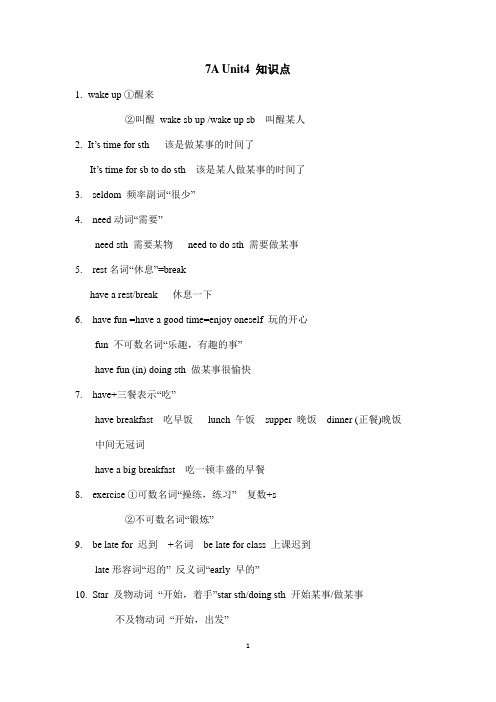
7A Unit4 知识点1.wake up ①醒来②叫醒wake sb up /wake up sb 叫醒某人2.It’s time for sth 该是做某事的时间了It’s time for sb to do sth 该是某人做某事的时间了3.seldom 频率副词“很少”4.need动词“需要”need sth 需要某物need to do sth 需要做某事5.rest名词“休息”=breakhave a rest/break 休息一下6.have fun =have a good time=enjoy oneself 玩的开心fun 不可数名词“乐趣,有趣的事”have fun (in) doing sth 做某事很愉快7.have+三餐表示“吃”have breakfast 吃早饭lunch 午饭supper 晚饭dinner (正餐)晚饭中间无冠词have a big breakfast 吃一顿丰盛的早餐8.exercise ①可数名词“操练,练习” 复数+s②不可数名词“锻炼”9.be late for 迟到+名词be late for class 上课迟到late形容词“迟的” 反义词“early 早的”10.Star 及物动词“开始,着手”star sth/doing sth 开始某事/做某事不及物动词“开始,出发”The party starts with an English song.晚会以一首英文歌开始。
11.quarter 一刻钟;四分之一12.past 介词“晚于;经过go past”past 名词“往时,昔日,过去”13.first 副词“首先” at first 首先,起初After school,I always finish my homework.放学后,我总是先完成我的家庭作业。
序数词“第一”Sunday is the first day of a week. 星期天是一周的第一天。
七年级英语7aunit4知识点牛津译林版
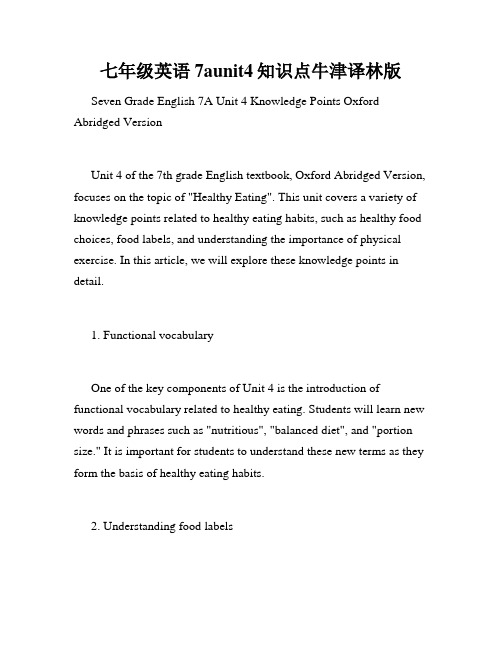
七年级英语7aunit4知识点牛津译林版Seven Grade English 7A Unit 4 Knowledge Points Oxford Abridged VersionUnit 4 of the 7th grade English textbook, Oxford Abridged Version, focuses on the topic of "Healthy Eating". This unit covers a variety of knowledge points related to healthy eating habits, such as healthy food choices, food labels, and understanding the importance of physical exercise. In this article, we will explore these knowledge points in detail.1. Functional vocabularyOne of the key components of Unit 4 is the introduction of functional vocabulary related to healthy eating. Students will learn new words and phrases such as "nutritious", "balanced diet", and "portion size." It is important for students to understand these new terms as they form the basis of healthy eating habits.2. Understanding food labelsAnother important knowledge point covered in this unit is how to read food labels. Students will learn how to identify the different types of nutrients, such as fat, salt, and sugar, and how to understand their measurements. By being able to read food labels, students can make informed decisions about their food choices.3. Healthy food choicesUnit 4 also covers the importance of making healthy food choices. Students will learn about the food groups, such as fruits and vegetables, carbohydrates, proteins, and fats, and the essential nutrients found in each group. By understanding the importance of a balanced diet and the nutrients required for healthy living, students can make better food choices.4. Exercise for a healthy lifestyleFinally, Unit 4 emphasizes the importance of physical exercise for a healthy lifestyle. Students will learn about the different types of exercise and their benefits, such as cardio, strength training, and flexibility exercises. By understanding the different types of exercise and their benefits, students can make informed decisions about their physical activity.ConclusionUnit 4 of the 7th-grade English textbook, Oxford Abridged Version, covers a variety of knowledge points related to healthy eating habits and physical exercise. By understanding functional vocabulary, reading food labels, making healthy food choices, and incorporating physical activity into their daily routine, students can develop a healthy lifestyle. By following these knowledge points, students can maintain their physical and mental health and achieve greater success in their academic and personal lives.。
人教版七年级英语上册Unit4短语句型知识点总结
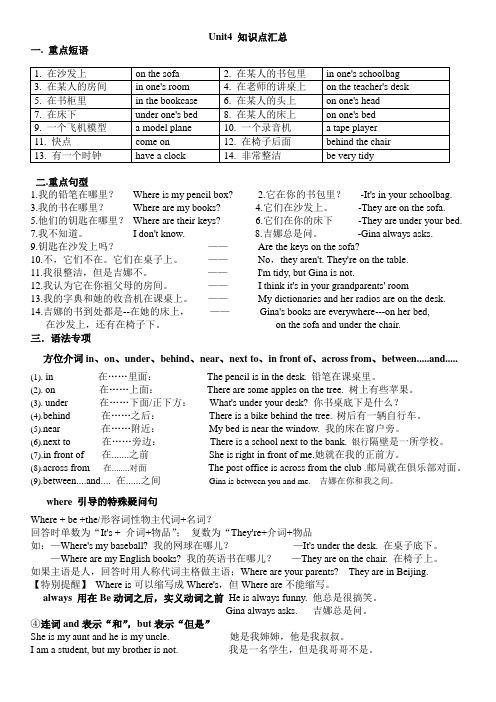
Unit4 知识点汇总一.重点短语1. 在沙发上on the sofa2. 在某人的书包里in one's schoolbag3. 在某人的房间in one's room4. 在老师的讲桌上on the teacher's desk5. 在书柜里in the bookcase6. 在某人的头上on one's head7. 在床下under one's bed 8. 在某人的床上on one's bed9. 一个飞机模型 a model plane 10. 一个录音机 a tape player11. 快点come on 12. 在椅子后面behind the chair13. 有一个时钟have a clock 14. 非常整洁be very tidy二.重点句型1.我的铅笔在哪里?Where is my pencil box?2.它在你的书包里?-It's in your schoolbag.3.我的书在哪里?Where are my books?4.它们在沙发上。
-They are on the sofa.5.他们的钥匙在哪里?Where are their keys?6.它们在你的床下-They are under your bed.7.我不知道。
I don't know.8.吉娜总是问。
-Gina always asks.9.钥匙在沙发上吗?——Are the keys on the sofa?10.不,它们不在。
它们在桌子上。
——No,they aren't. They're on the table.11.我很整洁,但是吉娜不。
——I'm tidy, but Gina is not.12.我认为它在你祖父母的房间。
——I think it's in your grandparents' room13.我的字典和她的收音机在课桌上。
七年级英语上册第四单元知识点
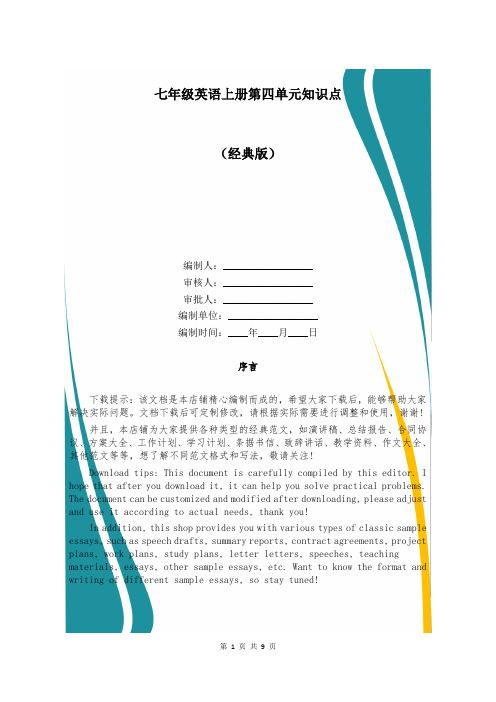
七年级英语上册第四单元知识点(经典版)编制人:__________________审核人:__________________审批人:__________________编制单位:__________________编制时间:____年____月____日序言下载提示:该文档是本店铺精心编制而成的,希望大家下载后,能够帮助大家解决实际问题。
文档下载后可定制修改,请根据实际需要进行调整和使用,谢谢!并且,本店铺为大家提供各种类型的经典范文,如演讲稿、总结报告、合同协议、方案大全、工作计划、学习计划、条据书信、致辞讲话、教学资料、作文大全、其他范文等等,想了解不同范文格式和写法,敬请关注!Download tips: This document is carefully compiled by this editor. I hope that after you download it, it can help you solve practical problems. The document can be customized and modified after downloading, please adjust and use it according to actual needs, thank you!In addition, this shop provides you with various types of classic sample essays, such as speech drafts, summary reports, contract agreements, project plans, work plans, study plans, letter letters, speeches, teaching materials, essays, other sample essays, etc. Want to know the format and writing of different sample essays, so stay tuned!七年级英语上册第四单元知识点学习知识容易,转化成为能力很难;提出问题容易,得到圆满答复很难;点评别人容易,身临其境去做很难;指责同事容易,正确评价自己很难。
上海牛津英语7A-Unit4、5知识点及语法重点

教学内容:7A Unit4、5知识点及语法重点(现在完成时)教学重点:三种时态的训练和巩固教学难点:现在完成时—瞬间动词与延续性动词的转换教学过程:1、课文知识点讲解2、时态练习3、练习巩固4、家庭作业1. 用there be句型表示客观存在(就近原则)2.现在完成时(一)含义现在完成时用来表示现在之前已发生或完成的动作或状态,但其结果却和现在有联系, 也就是说, 动作或状态发生在过去但它的影响现在还存在。
e.g. I have lost my wallet. (含义是:现在我没有钱花了。
)Jane has laid the table.(含义是:已可以吃饭了。
)Michael has been ill.(含义是:现在仍然很虚弱。
)He has returned from abroad. (含义是:现在已在此地)(二)结构助动词have /has+动词过去分词,主语为第三人称单数用has,其他人称用have 。
(三)句型1、肯定句:主语+have /has+动词过去分词+其他。
I have studied English for 5 years .2、否定句:主语+have /has+not +动词过去分词+其他。
We haven’t been there .3、一般疑问句:Have/Has+主语+动词过去分词+其他?Has he eaten that apple ?4、特殊疑问句:特殊疑问词+ have /has +主语+动词过去分词+其他?(四)用法1、现在完成时可以用来表示发生在过去某一时刻的、持续到现在的情况,常与for, since连用。
e.g. Mary has been ill for three days.I have lived here since 1998.2、现在完成时往往同表示不确定的过去时间状语连用, 如already, yet, just, before, recently, lately等:e.g. He has already obtained a scholarship.I haven’t seen much of him re cently (lately).We have seen that film before.Have they found the missing child yet?3、现在完成时常常与表示频度的时间状语连用e.g. Have you ever been to Beijing?I have never heard Bunny say anything against her.I have used this pen only three times. It is still good.George has met that gentleman on several occasions.4、现在完成时还往往可以同包括现在时间在内的时间状语连用,如now, up to these few days/weeks/months/years, this morning/week/month/year, now, just, today, up to present, so far等。
Unit4 短语句型默写2024-2025学年新版牛津译林版七年级英语上册

7A Unit4School daysWelcome to the unit1 学习是打开世界的钥匙Learning is the key to unlocking the world.2 ★做某事的关键the key to doing...3 学习如何谈论我们的学校生活learn how to talk about our school life4 吃早饭/午饭/晚饭have breakfast/ lunch / dinner 【三餐前不加the】5 ★做早操/眼保健操do morning/eye exercises 【exercise:操练,练习可数】6 ★做更多的锻炼do/take more exercise 【exercise:锻炼不可数】7 ★做课后活动do after-school activities8 帮助家务help with housework9 ★在工作日on weekdays10 在周末at/on weekends = at/on the weekend11 去短暂的慢跑go for a short jog12 ★加入排球俱乐部join the V olleyball Club13 读了一点read a little14 ★玩的开心enjoy oneself = have fun = have a good time15 ★做某事的方法way to do...= way of doing=how to do...16俱乐部活动是我玩的愉快并结交朋友的好方法Club activities are s good way for me to enjoy myself and makefriends.Reading17 我的第一个学期my first term18 我最喜欢语文I like Chinese best.= My favourite subject is Chinese.19 阅读许多著名作家的作品read the works of many famous writers20 ★因为.....而著名be famous for......21 ★作为.....而著名be famous as......22 中国语言令人惊奇The Chinese language is really amazing.23 研究许多活物study many living things24 了解大自然learn about nature25 ★练习做某事practise doing....26 有一个野外考察have a field trip27 ★动身去,到....地方去leave for28 ★收到某人来信hear from sb = get a letter from sb.29 ★希望做某事hope to do ..... 【没有hope sb to do sth】30 希望不久收到你的来信Hope to hear from you soon.31 ★我在校排球队I am in the school volleyball team.=I am a member of the school volleyball team32 明天早晨我们将到公园去摘苹果Tomorrow morning we will leave for a farm to pick apples.33 我们在周二和周四上生物课We have Biology classes on Tuesdays and Thursdays.34 我想要告诉你关于我的学校生活I would like to tell you about my school life.35 ★说一点中文speak a little Chinese36 ★迫不及待做某事can’t wait to do...37 一切顺利All the bestGrammar ---Further studyFurther study38 ★没有许多时间去打网球don’t have much time to play tennis39 在体育场on the sports field40 ★去溜旱冰go roller skating41 跳舞半小时dance for half an hour42 学习如何种植苹果learn how to grow apples43 长大grow up44 帮助种树help plant trees45 在学校网站上on the school website46 看视频watch a video 【video 复数videos】47 参观田野have a tour of the fields48 带一些苹果回家take some apples home49 我喜欢呆在外面I like being outside.50 ★亲近大自然是好的It’s nice to get close to nature.51 ★享受和平和安静enjoy the peace and quiet52 ★每个人都竭尽全力让事情变得更好Everyone tries their best to make things better.53 竭尽全力,尽某人最大努力做某事try one’s best to do....54 ★有时候野外考察对我来说太累了Sometimes field trips are too tiring for me.55 保持我们学校区域干净感觉很好It feels good to keep our school area clean.56参加take part in = join in57帮助我学习如何照料植物help me learn how to take care of plants58轮流去做不同的值日任务take turns to do different chores59小组合作work in groups60给植物浇水water the plants61清空垃圾桶empty the bins62通过值日,我们每个人都为班级做事并学会团队合作We each do something for our class and learn about teamworkthrough chores.7A Unit4School daysWelcome to the unit1 学习是打开世界的钥匙2 ★做某事的关键3 学习如何谈论我们的学校生活4 吃早饭/午饭/晚饭5 ★做早操/眼保健操6 ★做更多的锻炼7 ★做课后活动8 帮助家务9 ★在工作日10 在周末11 去短暂的慢跑12 ★加入排球俱乐部13 读了一点14 ★玩的开心15 ★做某事的方法16俱乐部活动是我玩的愉快并结交朋友的好方法Reading17 我的第一个学期18 我最喜欢语文19 阅读许多著名作家的作品20 ★因为.....而著名21 ★作为.....而著名22 中国语言令人惊奇23 研究许多活物24 了解大自然25 ★练习做某事26 有一个野外考察27 ★动身去,到....地方去28 ★收到某人来信29 ★希望做某事30 希望不久收到你的来信31 ★我在校排球队32 明天早晨我们将到公园去摘苹果33 我们在周二和周四上生物课34 我想要告诉你关于我的学校生活35 ★说一点中文36 ★迫不及待做某事37 一切顺利Grammar ---Further studyFurther study38 ★没有许多时间去打网球39 在体育场40 ★去溜旱冰41 跳舞半小时42 学习如何种植苹果43 长大44 帮助种树45 在学校网站上46 看视频47 参观田野48 带一些苹果回家49 我喜欢呆在外面50 ★亲近大自然是好的51 ★享受和平和安静52 ★每个人都竭尽全力让事情变得更好53 竭尽全力,尽某人最大努力做某事54 ★有时候野外考察对我来说太累了55 保持我们学校区域干净感觉很好56参加57帮助我学习如何照料植物58轮流去做不同的值日任务59小组合作60给植物浇水61清空垃圾桶62通过值日,我们每个人都为班级做事并学会团队合作。
牛津译林版英语7AUnit4Myday知识归纳与拓展

7A Unit4 My day知识概括与拓展【词汇分析】1. wake upwake up 意为“醒来;叫醒”。
Jim often wakes up at seven in the morning .吉姆常常清晨7 点醒来。
Please wake me up at half past six.请在六点半叫醒我。
wake up 意为“醒来”时,后来不接宾语;意为“叫醒”时,后来可接宾语,但当宾语是人称代词时,一定放在 wake 和 up 的中间。
It ’s 7: 30 now . Let’s wake up your brother .此刻已经7: 30 了,我们把你弟弟叫醒吧。
Don’ t talk so loudly . You will wake them up .别那么高声地说话,你会把他们吵醒的。
2. needneed 用作及物动词,意为“需要”,后来可接名词或代词作宾语。
need to do sth.和 need sb./ sth. to do sth.是两个常用构造,意为“需要(某人或某物 )做某事”; need 也可作名词,意为“需要”,in need of意为“需要”。
We need some chicken and vegetables.我们需要一些鸡肉和蔬菜。
You need to have a good rest.你需要好好歇息一下。
I need you to help me .我需要你来帮我。
I am in need of some money .我需要一些钱。
3. restrest 既可用作名词也可用作动词,意为“歇息,歇息”。
She needs a rest after her long illness.久病以后她需要静养一段时间。
(名词 )An old woman is resting under a big tree .一位老太婆正在一棵大树下歇息。
(动词 )【常有搭配】have a rest=take a rest 歇息4. startstart 意为“开始,着手,出发” ,既可用作及物动词也可用作不及物动词。
七年级上册Unit4的知识点

七年级上册Unit4的知识点Unit4是七年级上册的重要知识点,本文将从五个方面详细介绍。
一、语法知识1.一般现在时:表示经常发生的行为或状态,构成方式为主语+动词原形。
如:He plays basketball every day.(他每天打篮球。
)2.一般过去时:表示在过去某个时间发生的行为或状态,构成方式为主语+动词过去式。
如:I watched TV last night.(我昨晚看了电视。
)3.现在进行时:表示正在进行的行为或状态,构成方式为主语+be动词+动词-ing形式。
如:She is studying in the library.(她正在图书馆学习。
)4.一般将来时:表示将来会发生的行为或状态,构成方式为主语+will+动词原形。
如:We will go to the park tomorrow.(我们明天将去公园。
)5.动词不定式:表示行为或状态的意愿、目的或结果,构成方式为to+动词原形。
如:We want to watch a movie.(我们想看电影。
)二、词汇知识1.家庭成员:father(父亲)、mother(母亲)、brother(兄弟)、sister(姐妹)、grandfather(祖父)、grandmother(祖母)2.学科名称:math(数学)、science(科学)、history(历史)、English(英语)、geography(地理)3.人物职业:teacher(教师)、doctor(医生)、policeman(警察)、singer(歌手)、dancer(舞者)4.食品饮料:hamburger(汉堡包)、pizza(披萨)、orange juice(橙汁)、water(水)、coffee(咖啡)5.时光顺序:first(首先)、next(接着)、then(然后)、after that(之后)、finally(最后)三、句型知识1.I like sports.(我喜欢运动。
(完整版)人教版七年级上册英语知识点全第四单元unit4知识点

(完整版)⼈教版七年级上册英语知识点全第四单元unit4知识点Unit4重点词汇:where、table、bed、bookcase、sofa、chair、on、under、come、desk、tidy、always...1、重点短语:on the sofa 在沙发上 on the table 在桌上on your head 在你的头上 under the chair在椅⼦下under the bed 在床下 under the table 在桌下in your schoolbag 在你的书包⾥ in the bookcase 在书柜⾥in your grandparents’ room 在你爷爷奶奶的房间⾥come on 快点2、where引导的特殊疑问句,⽤于询问“某⼈或某物在哪⾥”,若谓语动词为be动词,其结构为“Where + be + 主语?”,be动词要与后⾯的主语保持⼀致。
其答语,⽤“主语+be+表⽰地点的的介词短语”为避免重复,句中的主语⼀般⽤代词代替。
----Where is/are...?----It’s/They’re on /in/under...----Where is my English book?----It’s on the desk.1)My clock is on the table?(就画线部分提问)________ ________ your clock?2)你的爸爸在哪?(翻译下列句⼦)______________________________________________3、on 在……的上⾯(接触) on the sofa/desk/table/bed on the tree 在树上(本⾝固有的)in 在……的⾥⾯ in your schoolbag/room in the tree 在树上(外来的事物)under 在……的下⾯(正下⽅) under your bed/desk若表⽰“某物在某地”则⽤“物 + be + 介词短语”结构。
译林牛津重点初中英语7年级上册(7A)第四单元Unit4知识点汇总
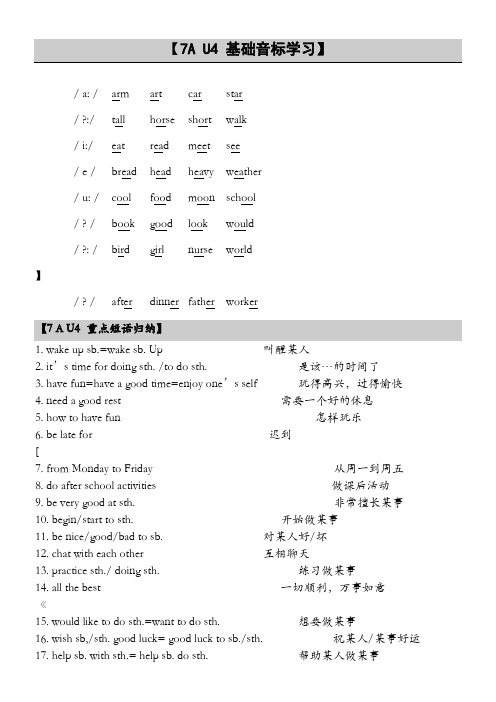
/ a: / arm art car star/ ?:/ tall horse short walk/ i:/ eat read meet see/ e / bread head heavy weather/ u: / cool food moon school/ ? / book good look would/ ?: / bird girl nurse world】/ ? / after dinner father worker【7 A U4 重点短语归纳】1. wake up sb.=wake sb. Up 叫醒某人2. it’s time for doing sth. /to do sth. 是该…的时间了3. have fun=have a good time=enjoy one’s self 玩得高兴,过得愉快4. need a good rest 需要一个好的休息5. how to have fun 怎样玩乐6. be late for 迟到[7. from Monday to Friday 从周一到周五8. do after school activities 做课后活动9. be very good at sth. 非常擅长某事10. begin/start to sth. 开始做某事11. be nice/good/bad to sb. 对某人好/坏12. chat with each other 互相聊天13. practice sth./ doing sth. 练习做某事14. all the best 一切顺利,万事如意《15. would like to do sth.=want to do sth. 想要做某事16. wish sb,/sth. good luck= good luck to sb./sth. 祝某人/某事好运17. help sb. with sth.= help sb. do sth. 帮助某人做某事18. go roller skating 溜旱冰19. between Sunshine Middle School and Moonlight Middle School在阳光中学和月光中学之间20. Sunshine Sports Centre 阳光体育中心21. at/on weekends=at/on the weekends 在周末[22. first=at first=first at all 首先23. visit the museums 参观博物馆24. twice a month 一个月两次25. go on a picnic=have a picnic 去野营26. once a week 一个星期一次27. go on a class/autumn trip 去班级/秋天之旅28. be good/bad for sb. 对某人有利/害29. get ready for sth. 为某事做好准备~30. learn a lot about sth.=know much about sth. 知道很多有关某事【7A U4 重点语法点拨】时间介词(at, in ,on) 的用法1.at(1)时间的一点、时刻等。
新人教版七年级(上册)Unit 4 知识点总结

新人教版七年级(上册)Unit 4 知识点总结nit 4 My Favourite Subject一、短语归纳1. the importance of ……..的重要性2. favourite subject 最喜欢的学科3. wake up 醒来4. be late for 迟到5. come on 快点6. next class 下一节课7. learn about 了解;学习;知道8. be good with 灵巧的;善于应付…的9. help sb with 帮助某人做(某事)10. look at sth 看某物11. let sb do sth 让:果人做某事12. listen to 听;倾听13. be good at 擅长14. walk to school 步行去卜:学15. work hard 努力工作16. make sb /sth+adj. 计果人 /物17. make sb do sth 让某人做果事18. on that day 在那天19. the same as 与……一样20. all kinds of 各种各样的21. want to be 想要成为22. in the future 将来;未来23. work out 计算出;解决24. in class 课堂上25. feel like 感觉像26. in one's life 在某人的生活中二、必背重点句型1. 谈论最喜欢的学科:——What's your favourite subject?你最喜欢的学科是什么?——My favourite subject is English.我最喜欢的学科是英语。
2. 询问原因并给出理由:-——Why do you like it?你为什么喜欢它?——It's interesting to learn about the past. 了解过去是有趣的。
人教版七年级上册英语Unit4知识点梳理及语法讲义(学生版)

七年级上册英语Unit 4知识点与语法精讲精练词汇梳理(一)完成单词梳理:名词:1. 桌子 2. 床 3. 书架;书柜4. 沙发5. 椅子6. 书桌7. 房间8. 帽子9. 头10. 收音机11. 时钟12. 磁带;录音带13. 播放机14. 模型15. 飞机动词:1. 来;来到 2. 认为;想;思考 3. 知道;了解代词:1. 他(她、它)们的 2. 我们的介词:1. 在……上 2. 在……下副词:1. 在哪里;到哪里 2. 处处;到处;各个地方3. 总是连词:1. 但是形容词:1. 整洁的;井井有条的感叹词:1. 是的;对(二) 词汇变形小结:1. they (人称代词主格:他/她/它们) — (人称代词宾格) — (形容词性物主代词:他/她/它们的) — (名词性物主代词:他/她/它们的)2. tidy (adj. 整洁的) — (反义词:不整洁的)3. radio (n. 收音机) — (复数)4. we(人称代词主格:我们) — (人称代词宾格) — (形容词性物主代词:我们的) — (名词性物主代词:我们的)【练一练】用所给词的适当形式填空1.Look! Those are four (bed) in my house.rry and I are Bill’s daughters, so Bill is(we) father.3.Those old CD( player) are very nice.4.Susan and Emma thank(they) teacher for helping them find the keys.5.Tina (e) to the gym and plays sports.6.These (room) are too small.7.Look! Your model plane (be) on the sofa.8.The Chinese book is (he).9.Look at my (mother) room. It’s very clean.10.These are (they) baseballs.(三) 短语攻关:快点儿磁带播放机飞机模型在沙发上在某人的书包里在某人的床下面在某人的头上讲桌铅笔盒电脑游戏知识点梳理1. Where are my books? 我的书在哪里?【用法详解】“Where+be动词+主语?”该句型为where引导的特殊疑问句,用来询问“某人或某物在哪里?”。
- 1、下载文档前请自行甄别文档内容的完整性,平台不提供额外的编辑、内容补充、找答案等附加服务。
- 2、"仅部分预览"的文档,不可在线预览部分如存在完整性等问题,可反馈申请退款(可完整预览的文档不适用该条件!)。
- 3、如文档侵犯您的权益,请联系客服反馈,我们会尽快为您处理(人工客服工作时间:9:00-18:30)。
7A Unit4 重点词组、难点解析、语法复习
【词组总汇】
Comic strip &Welcome to the unit
1.wake up 醒醒P.42
2.go walking in the hills 在山间散步P.42
3.after breakfast/lunch 早餐/午饭过后P.42
4.have breakfast/lunch 吃早饭/午饭P.42
5.need a good rest 需要好好休息P.42
6.how to have fun 如何享乐P.42
7.a day at school 在校的一天P.43
8.get up 起床P.43
9.do morning exercises 做早操P.43
10.have lessons 上课P.43
11.do after-school activities 进行课外活动P.43
12.watch TV 看电视P.43
13.do homework 做家庭作业P.43
14.be late for school 上学迟到P.43
15.at a quarter past eight 在八点一刻P.43
Reading
1.school life 学校生活P.44
2.write to her online friend 写信给她的网友P.44
3.a student at Sunshine Middle School 阳光中学的一名学生P.44
4.from Monday to Friday 从星期一到星期五P.44
5.my favourite subject 我最喜欢的学科P.44
6.a lot of friends 许多朋友P.44
7.chat with each other 互相聊天P.44
8.play in the playground 在操场上玩P.44
9.go to the library 去图书馆P.44
10.read books there on Tuesday and Thursday 周二和周四在那儿读书P.44
11.in the school volleyball team 在校排球队P.44
12.on Wednesday afternoon 在星期三下午P.44
13.have a good time 玩得愉快P.44
14.Best wishes 最美好的祝愿P.44
Grammar
1.plant trees 植树P.47
2.in March 在三月份P.47
3.in winter 在冬天P.47
4.in 2022 在2022年P.47
5.our summer holiday 我们的暑假P.47
6.have lots of fun 玩得开心P.47
7.on Children’s Day 在儿童节P.47
8.at six years old 在六岁时P.47
9.Thanks for your email. 谢谢你的邮件。
P.47
10.would like to tell you about my life here 想要告诉你我在这儿的生活P.47
11.this year 今年P.47
12.have much time to play tennis 有许多时间打网球P. 48
13.dancing lessons 舞蹈课P. 48
14.a member of the swimming team 游泳队的一名成员P. 48
15.dance for half an hour 跳舞半小时P. 48
16.go roller skating 溜旱冰P. 48
Integrated skills
1.between… and…在…和…之间P.50
2.this Saturday evening 这个周六晚上P.50
3.good luck 好运P.50
4.visit the museums 参观博物馆P.50
5.twice a month 一月两次P.50
6.go on picnics with my family 和我的家人一起去野炊P.50
7.once a week 一周一次P.50
Study skills
1.a car in the park 公园里的汽车P.51
2.a girl in a skirt 穿短裙的女孩P.51
Task
1.be good for 对…有好处P.52
2.get ready for 为…做准备P.52
3.learn a lot about the world 学习许多有关世界的知识P.52
4.too much homework 太多的家庭作业P.52
5.all the lessons at school 学校所有的课程P.52
【难点解析】
1.wake up 醒醒P.42
a.不及物动词短语,adj.+adv. 表示“醒来”
b.及物动词短语,表示“叫醒…”如果所接宾语时人称代词,只能放在up之前,若
所接宾语时名词,放在up前后均可。
例如:
wake me up 把我叫醒
wake up Millie / wake Millie up 把米莉叫醒
e.g.: 1. 我不想早醒,但是我妈妈总是早早地把我叫醒。
I don’t want to wake up early, but my mother always wakes me up early.
2. 请明天早上六点叫醒John。
Please wake John up / wake up John at 6:00 tomorrow morning.
2. Is it time for breakfast?到时间吃早饭了吗?P.42
= Is it time to have breakfast?
句子结构:It's time for sth. 到…的时间了。
= It's time to do sth.。
